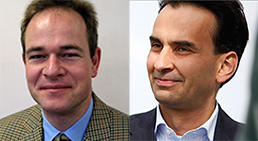Integrating History Research into the KFG Agenda - Report on the first International Author's Workshop on "Hidden Continuities: From Interwar to Postwar Forms of Cooperation and Integration in Europe"
Nov 10, 2014
The diffusion and transfer of ideas, policies, and institutions across space is not a new phenomenon. For this reason, history forms an important dimension of the KFG’s agenda. During the KFG's second funding period, professors Wolfram Kaiser (University of Portsmouth) and Kiran Klaus Patel (Maastricht University; in 2014/15 Gerda Henkel Visiting Professor at LSE in London) join the KFG as permanent senior fellows to investigate how such processes have unfolded in the past.
Together, they organize four workshops that will eventually lead to several publications. Two workshops, for which Kiran Patel will take the lead, analyze the “hidden continuities” of forms of governance in and for Europe between the interwar years, the period of World War Two, and the postwar era since 1945. The second set of workshops, which will be led by Wolfram Kaiser, will scrutinize the multiple connections in postwar European cooperation among different international organizations.
All four workshops start from the assumption that a lot can be gained by placing the European Union and its direct predecessors into the wider framework of other international organizations and transnational forums. De-centering the EU can help to demonstrate the multiple ways in which European integration emerged from governance techniques debated and tried out long before 1945. Jean Monnet’s involvement in the Allied Maritime Transport Council during World War One as an innovative form of international governance forms an example of continuities at the level of actors from pre-1945 cooperation to postwar integration. De-centering the European Union also reveals that, in many ways, the EU has always been connected to other institutions be it as precursors, rivals, cooperation partners, or in several other forms. For instance, organizations such as the Organisation for Economic Co-operation and Development (OECD) and the Council of Europe often served as sources of inspiration for the European Communities. The fact that the most well-known symbol of today’s EU, the flag, was first developed for the Council of Europe exemplifies this fact.
The first workshop on these issues has taken place on October 23-24, 2014 in Berlin. An international and interdisciplinary group of scholars debated the various hidden continuities connecting interwar, wartime, and postwar forms of cooperation and integration in Europe.
In his paper, Antoine Vauchez (Paris) argued that the concept of independent institutions, which became so central in postwar integration, can be traced back to the League of Nations and hence to the very first years after World War One. Mikael Rask Madsen (Copenhagen) scrutinized continuities in human rights discussions by describing the role of judges. Wolfram Kaiser’s paper was more concerned with continuities of institutional concepts and practices, highlighting the role of technocratic internationalism with its roots in nineteenth century governance forms and its impact on various institutions during the twentieth century. Vincent Lagendijk (Maastricht) highlighted the continuities in the field of electricity policy from World War One to the late 1950s, which he characterized as a process of Europeanization.
The next two papers both discussed the role of the International Labour Organization (ILO) as a bridge from the interwar to the postwar era. Sandrine Kott (Geneva) demonstrated that during its early days, the ILO was dominated by European actors and their concerns; this was much less the case during the postwar era. Lorenzo Mechi (Padova) highlighted the negotiations about manpower policies as an example in which the ILO became a depositary for later debates. In their contributions, Julia Eichenberg (Berlin) and Antonin Cohen (Paris) both zoomed in on wartime networks and their impact on postwar integration. While Eichenberg highlighted the impact of transnational cooperation of exiles in London, Cohen discussed the ideological continuities from French personalism to the Schuman declaration of 1950.
In his paper, Brian Shaev (Pittsburgh) highlighted the continuous support of trade liberalization of French and German socialists from the 1920s to the 1950s. Léonard Laborie (Paris) revealed the continuities in attempts to build Europe on postal networks. He demonstrated that some wartime ideas were strikingly similar to postwar debates, even if these earlier concepts were not referred to anymore. In their co-authored contribution, Frédéric Clavert (Paris) and Emmanuel Mourlon-Druol (Glasgow) demonstrated the structural similarities between interwar and postwar cooperation among central bankers. Christian Henrich-Franke (Siegen) argued that the transport and telecommunication sectors saw a lot of European cooperation, even if most activities took place outside of the EC/EU framework. Guido Thiemeyer (Düsseldorf), finally, was not able to attend, but his paper on the governance of Rhine navigation added to the mix of policy sectors discussed at the meeting.
In sum, the workshop revealed the multiplicity of connections between the various forms and forums of cooperation and integration in Europe during the twentieth century as an issue neglected in existing research. Besides its empirical concerns, the workshop also discussed the applicability of concepts and theories such as path dependency, epistemic communities, and advocacy coalitions. Transferring these concepts to historical frameworks and methodologies yielded a lot of new insights, and for all these aspects, paper-givers profited from Tanja Börzel (Berlin), Barbara Fritz (Berlin), Hartmut Kaelble (Berlin), Thomas Risse (Berlin) and Johan Schot (Sussex), who acted as discussants.
A follow-up workshop on this issue will take place in June 2015. The first of the two workshops to investigate the inter-institutional links in postwar European cooperation will be held in late January 2015.
By Kiran Klaus Patel
